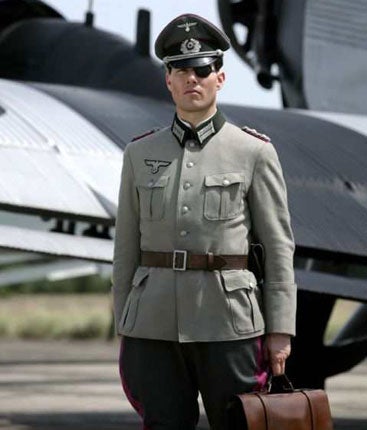Hollywood and the Holocaust
Germany's Nazi past is proving a rich, if controversial, inspiration for a new generation of film-makers

Your support helps us to tell the story
From reproductive rights to climate change to Big Tech, The Independent is on the ground when the story is developing. Whether it's investigating the financials of Elon Musk's pro-Trump PAC or producing our latest documentary, 'The A Word', which shines a light on the American women fighting for reproductive rights, we know how important it is to parse out the facts from the messaging.
At such a critical moment in US history, we need reporters on the ground. Your donation allows us to keep sending journalists to speak to both sides of the story.
The Independent is trusted by Americans across the entire political spectrum. And unlike many other quality news outlets, we choose not to lock Americans out of our reporting and analysis with paywalls. We believe quality journalism should be available to everyone, paid for by those who can afford it.
Your support makes all the difference.When Tom Cruise dons his eye patch and steps into the world's multiplexes on Boxing Day as Colonel Claus von Stauffenberg in the much-anticipated biopic Valkyrie, he will be leading an attack. It's the first of a host of films starring A-list actors that revisit the Nazi era in Germany and show how it has affected subsequent decades.
The brutality of the Nazi regime and the horror of the Holocaust have held a grim fascination for 60 years. Until now, however, the subject has mainly been tackled in the cinema through romanticised war films or hard-hitting attempts at docu-drama, such as Schindler's List.
Cruise's film dramatises the failed plot to assassinate Hitler in 1944. Like Downfall, the groundbreaking German film about Hitler's final days in his bunker, it shows the war from a German point of view.
It will be followed by several films that look at the aftermath of the Holocaust. Adam Resurrected, starring Jeff Goldblum and Willem Defoe, is about a circus entertainer who, spared the gas chamber, comes to terms with his history while in an Israeli mental institution in 1961.
The Reader has Kate Winslet as a German woman with a secret past and Ralph Fiennes as her former lover, who discovers that secret during the Nuremberg trials. Defiance sees Daniel Craig switch the guile of James Bond for that of Tuvia Bielski, one of three Jewish brothers who became resistance fighters in the Belarussian forest.
Germany itself is also seeing a new generation tackle the subject of the Nazis, which for decades was too difficult for the nation to face. North Face, set in 1938, looks at the German attempt to conquer the north face of the Eiger for the glory of the Nazis. Recently released films include A Secret and One Day You'll Understand, both from France, in which a younger generation tries to piece together wartime Jewish history through the stories of their parents and grandparents.
Even Quentin Tarantino is making a Nazi-themed film. His much-anticipated Inglourious Basterds is about a Jewish girl seeking revenge alongside a platoon of Jewish-American soldiers.
While war films are nothing new, Dr Helmut Schmitz, who lectures in post-war German literature and culture at the University of Warwick, believes this slew of new films comes from a younger generation attempting to deal with a subject that is moving out of living memory.
"We are now in a generational shift," he said. "Over the past 10 years or so we have a whole new generation of consumers who do not have a big connection with this history. Films such as Downfall perhaps began the trend to look at these events from a post-cold war perspective."
He added, however, that he was "ambivalent" about whether the new trend was a good thing. "There's an argument it could increase knowledge," he said. "But to engage with it in the form of entertainment is perhaps not appropriate to the sober subject matter. Even if you empathise with the victims you can't fully understand the situation they're in."
The critic and playwright Bonnie Greer pointed out that these films were made while wars raged in Iraq and Afghanistan. "We've been in a longer war than the Second World War and in order to explain what that means we have to go back over other wars. I think the Holocaust has to be retold for each generation, and in the language of that generation," she said.
The veteran film critic Barry Norman agreed. "If they are accurate films then they will probably provide some much-needed education to the 12- to 25-year-olds who make up the majority of film audiences," he said.
Join our commenting forum
Join thought-provoking conversations, follow other Independent readers and see their replies
Comments